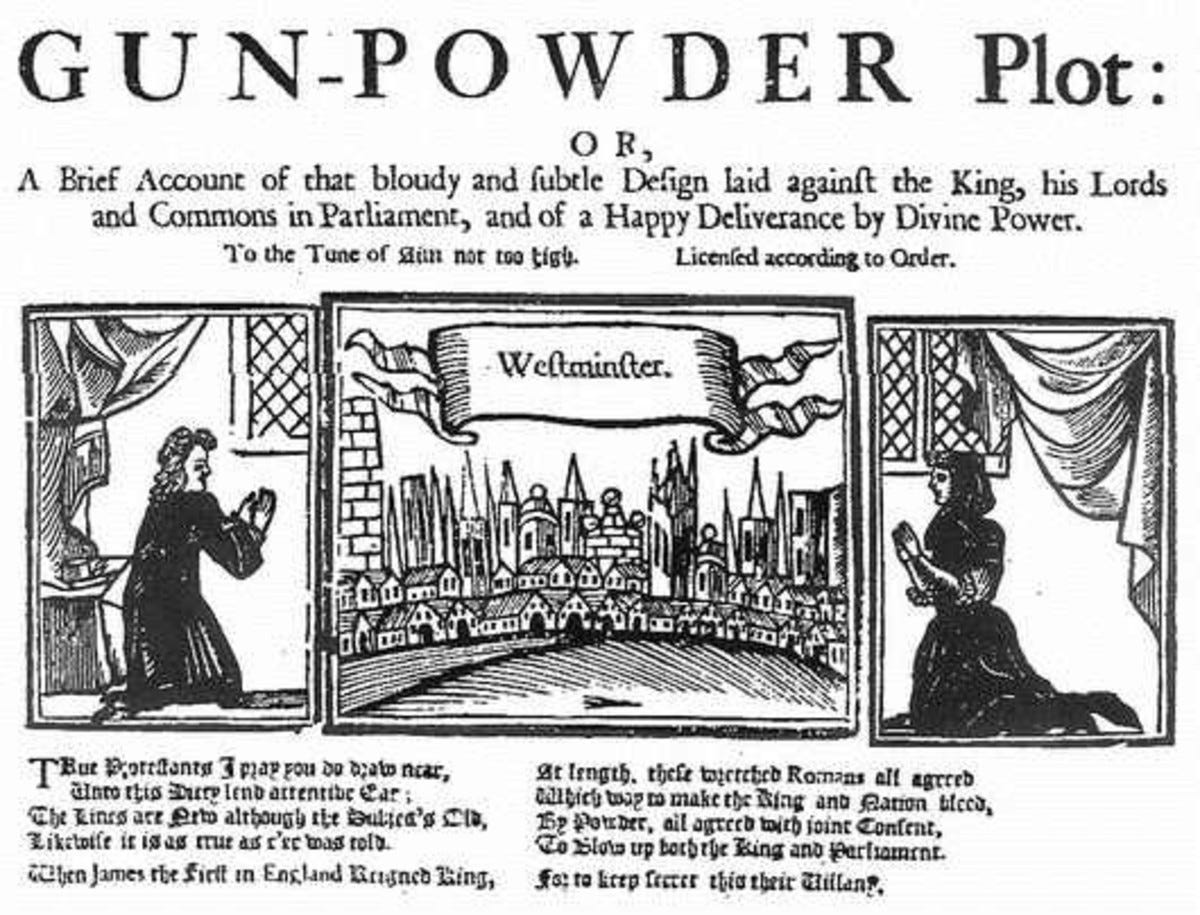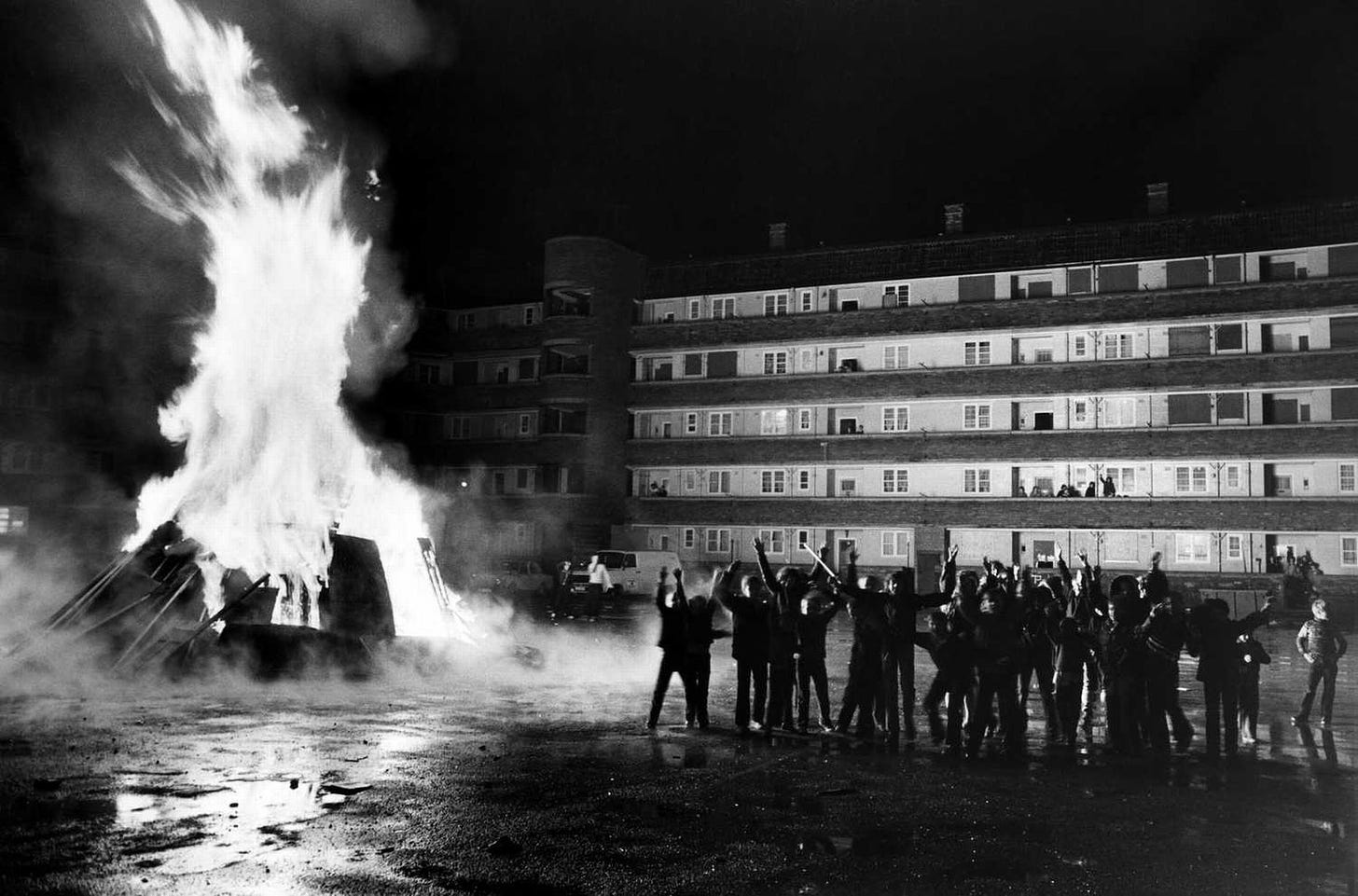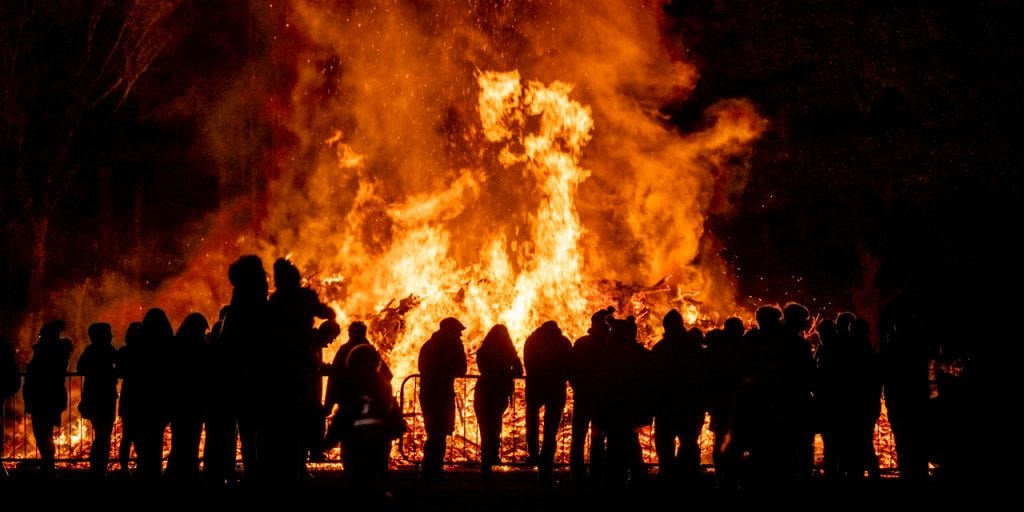Remember, remember!
The fifth of November,
The Gunpowder treason and plot;
I know of no reason
Why the Gunpowder treason
Should ever be forgot!
Guy Fawkes and his companions
Did the scheme contrive,
To blow the King and Parliament
All up alive.
Threescore barrels, laid below,
To prove old England’s overthrow.
But, by God’s providence, him they catch,
With a dark lantern, lighting a match!
A stick and a stake
For King James’s sake!
If you won’t give me one,
I’ll take two,
The better for me,
And the worse for you.
A rope, a rope, to hang the Pope,
A penn’orth of cheese to choke him,
A pint of beer to wash it down,
And a jolly good fire to burn him.
Holloa, boys! holloa, boys! make the bells ring!
Holloa, boys! holloa boys! God save the King!
Hip, hip, hooor-r-r-ray!I always loved Guy Fawkes night as a child. It was a regular winter gathering, one of my parents friends would host as their housing had a ‘private’ fireworks show. We got to play with sparklers and stay up late. The huge bonfires were awe inspiring and of course the fireworks incredible. It really is a wondrous night of explosion and mayhem.
It is also a night of English patriotism and of royalism, mixed in with some anti-Catholicism at least historically speaking!
Guy Fawkes Night or Bonfire Night is not about remembering or celebrating the rebel it is about celebrating the survival of the King. Of thanking Providence that the plot was uncovered and the treacherous Catholics unmasked and executed before they could kill the King and Parliament.
Of course you would not be remiss in not knowing that. Guy Fawkes is a myth that has been entirely reshaped by the forces of liberalism. Today people post about it and are sympathetic to Fawkes himself! They side with those who would overthrow order, who would rebel against the King and murder him. This can be amusing as the same people who might inadvertently follow this understanding of Fawkes might also be the ones upset at the murder of the Tsar! That is a contradiction that can’t actually stand.
So caught up in rebellion is our popular culture that Fawkes has been entirely rewritten as a character. In large part this is due to culture - the power of art and culture strikes once again. Alan Moore’s comic book, or graphic novel if you’re gay, V for Vendetta recast Fawkes as the persona of someone fighting for freedom in a totalitarian state. This then was picked up by the Wachowski brothers perverts who scripted and produced the film of the same name. It’s not an awful film, nor was it an awful story. Moore even wrote it subtly enough that the Detective pursuing V could be seen as the hero, not V. The film appeals to many and indeed was so iconic that an entire generation of online autists snapped up the rendition of the mask as their symbol.
There exists nothing better to me than the example of the 5th of November and the ability for societies to rewrite the past. Guy Fawkes was always, always the villain. One custom in England that was almost dead and gone as I grew up was for local lads to make a Guy then pull him around on a cart asking for “Penny for the Guy” donations for their handiwork. The Guy would then be burned on a local bonfire as part of the celebration. Again Guy is not the hero, he is the villain being burned upon a fire in symbolic celebration of the King and Parliament surviving!
The history of the night and celebrations is varied. It has waxed and waned over the years. It is seemingly declining in popularity. Once it was a community festival put on by local councils, those same councils now find themselves strangled by health and safety regulations or in the worst cases parts of London have almost no native white Englishmen who would celebrate it. As alluded to before children were often major drivers of this. The one time of the year you could build up a really big fire!
As much as the roots of the celebration go back to this moment of latent patriotism this is all a bit of intellectual window dressing. Children and adults valued it as a part of a community event and night. Building a bonfire together, going out, being part of it. Witnessing the spectacle of the fireworks, burning the Guy. There is an underlying sense of violence that is bound up in it. It is an almost primeval thing, the huge fires, the smoke, the explosions all really about the violence of the act. A celebration of strength and power. Their explosions were thwarted, we who are can make our own and survive.
The rewriting of Guy Fawkes, the intellectual smearing of it by Moore and then the liberal zeitgeist is on examination rather empty. Fawkes failed. He was executed. Only in the fictional world of Moore is he a hero and even then it is a curious choice of hero. Fawkes was fighting as part of the religious conflict of the era - but by this point the masses of England were Protestant. Moore in taking this Catholic icon and presenting him as someone the ordinary Anglo Anglican man would look up to is being subversive ahead of his time. There is something instinctual for me and I suspect for others - Fawkes represents the outsider. He is not like us. He attacked us. This from a time of more collective identity and homogeneity. Only a deracinated people who were once opposed to Catholics would suddenly turn around and herald a Catholic figure as their savior and martyr!
To any Catholics reading, don’t take this as in any way against you - it is just the reality of history. So powerful was this sentiment that it spread to the colonies as well. Here it was called Pope Night:
In Boston, the night started with two parades, one in the North End and one in the South End. Both featured an outsized effigy of the Pope, the devil or a hated political figure. Costumed revelers pulled the figure through the streets in a decorated cart, much like Mardi Gras
The parades ended with the two sides meeting and brawling. The winning side would take the cart, the money and the effigies of the loser, then burn the effigies in a bonfire and spend the money on a feast. The North Enders would do it on Boston Common, the South Enders on Copps Hill. People were killed or maimed in the fighting, and the town only had a handful of constables who couldn’t control the mob.
In America, as in England, the holiday had political overtones: Americans had been fighting the Catholic French for decades.
Can you imagine. That city that we now think of as a dying Catholic Irish redoubt once full of bawdy Anglicans burning effigys of the Pope and fighting. Truly immigration changes places…
Bonfire night just about survives. The original meaning is not totally lost or forgotten. It is simply that the power of the liberal mind virus is still very strong. People now reflexively side with the rebel over the King. That will not always be the case and indeed popular culture like the monarchist Lord of the Rings shows that the romantic desire to have a King to serve still exists within many. For now when you do remember the fifth of November think differently. Think of the origins, of a time when Kings still held the loyalty of the people. Think also of those community moments that are now dormant, not dead but sleeping.





![Anonymous Collective - #OpOhioOverwatch [engaged] - YouTube Anonymous Collective - #OpOhioOverwatch [engaged] - YouTube](https://substackcdn.com/image/fetch/w_1456,c_limit,f_auto,q_auto:good,fl_progressive:steep/https%3A%2F%2Fsubstack-post-media.s3.amazonaws.com%2Fpublic%2Fimages%2Ff733436e-be23-42bc-b217-6725a408da47_1280x720.jpeg)

